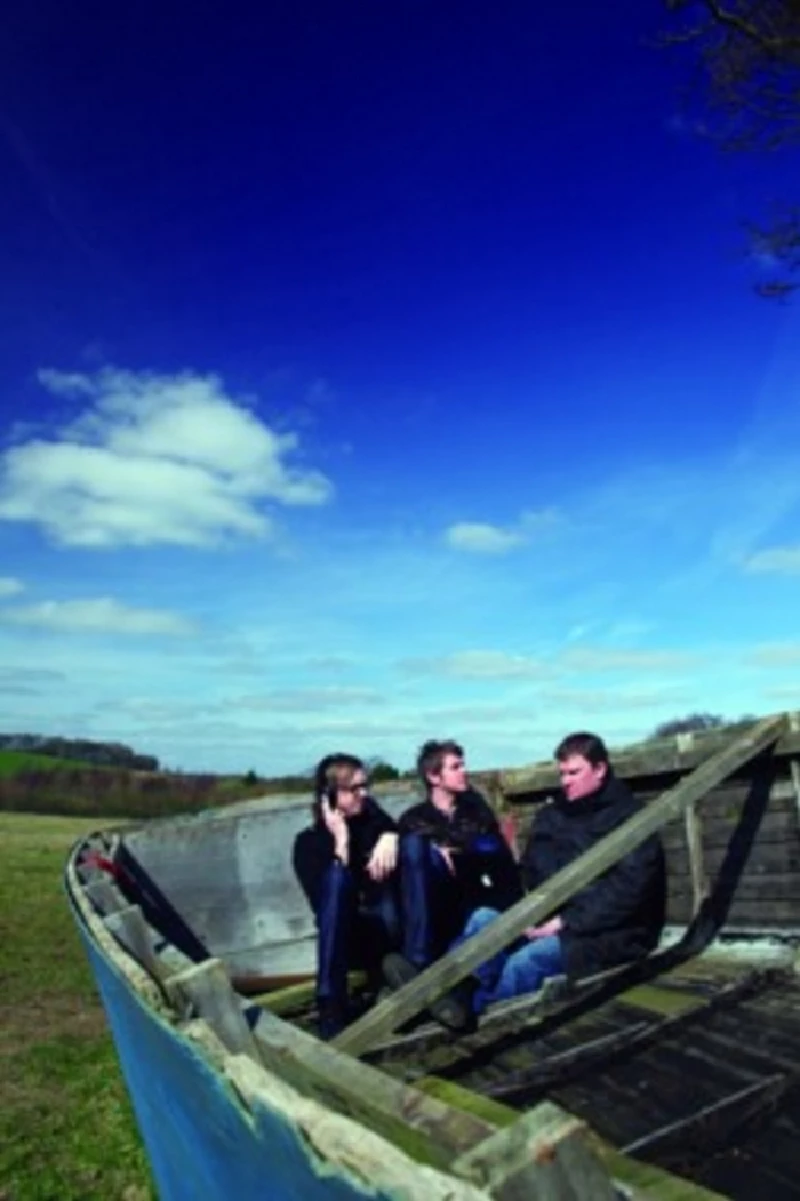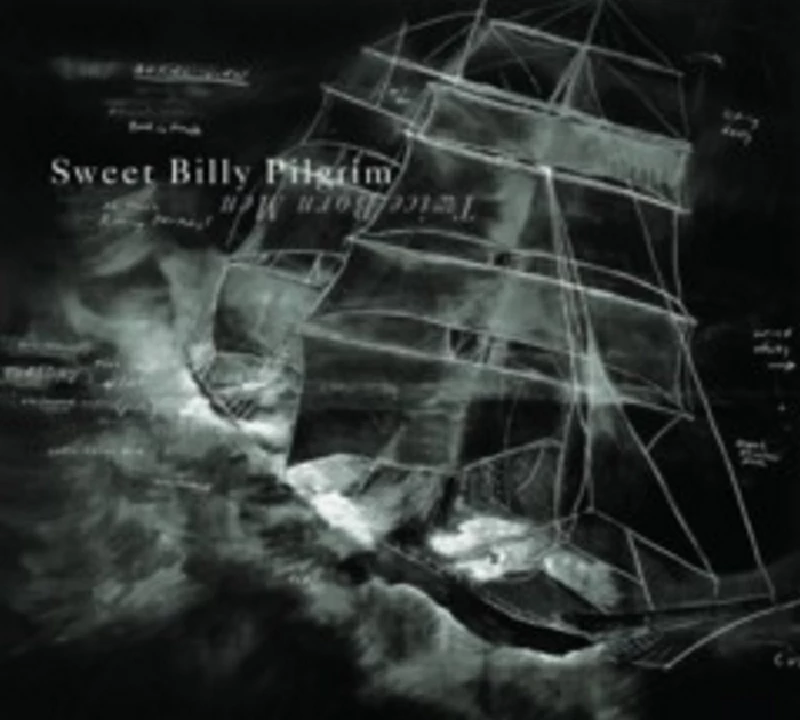Sweet Billy Pilgrim - Interview
by John Clarkson
published: 24 / 6 / 2009

intro
Critically acclaimed rising London-based trio Sweet Billy Pilgrim have just released their second album, 'Twice Born Men'. Singer Tim Elsenburg speaks to John Clarkson about it and how his band have taken their impossible-to-replicate studio album into the live setting
Upon its release in March, London-based group Sweet Billy Pilgrim's second album, 'Twice Born Men', was made the Sunday Times' Album of the Week. 'Twice Born Men' follows on from their 2005 debut, 'We Just Did What Happened and No One Came', and has been released on David Sylvian's Samadhisound label. The group, a trio, consists of Tim Elsenburg( vocals, guitar, harmonium, harmonica); Anthony Bishop(bass, banjo, cymbal and backing vocals)and Alistair Harner(drums, clarinet, loops and backing vocals). Outside the studio, Sweet Billy Pilgrim, who record all their music with the aid of Pro Tools at home in a garden shed, are joined by David Preece (keyboards, samples, tin whistle, samples, accordion and backing vocals). Ethereal, and yet also at points gritty and earthy, ‘Twice Born Men’ is a record of sublime contrasts. Atmospherically haunting and beautiful, but sometimes discordant, it is heavily textured with layer after layer of instrumentation pressed together. While orchestral, it also has a delicacy, both in its arrangements and Edensor’s vocals, which are also sometimes many overdubbed. With each of its eight songs about the obsessive nature of love, it captures both its sweeping highs, and sudden plumments into melancholy. In an interview with Pennyblackmusic, Tim Edensor spoke about ‘Twice Born Men’ and how he and his band have taken their impossible-to-replicate studio album into the live arena. PB: Both your albums were recorded and produced in a garden shed using a laptop and one main microphone. You have said that this has had a positive effect on your sound. In what sense? Is it just rather than pay for expensive studio time it allows you the time and freedom to play around until you have got it right? TE: Yes, that's pretty much the reason. I get to to spend several hours worrying about a cymbal sound without having to worry about a clock on a wall, or whether or not someone is slowly slipping into a coma next to me. There are some other reasons too; namely that, left to my own devices, there are likely to be more 'happy accidents', thanks to my lack of technical expertise. I don't really understand what the elements of a studio do or are capable of, so often I'll approach something in a way that someone who knows what they're doing would never even consider. Also, if I was in a professional studio with all their shiny gear and cutting edge software, the possibilities would literally be endless and I would never get anything done. Even with my limited means, I can spend a long time making something sound right, so with no practical boundaries I'd probably finish an album every 47 years. PB: Where does the title for the new album, ‘Twice Born Men’, come from? TE: 'Twice Born Men' was an organisation set up by Vietnam veterans, drawing attention to the plight of ex- soldiers who were struggling to adjust to the demands of civilian life. I saw the germ of an idea in the fact that Vietnam had taken these men, with their lives and their needs and their dreams and changed them entirely, to the point that life after a war like that could be a considered a rebirth: nothing that had gone before could prepare you for, or help you cope with, how things would be afterwards, so that coming home would be like starting again and probably not in a good way. It struck me that love could have similar - albeit less overtly traumatic - consequences. No one is the same after falling in love. If it lasts and blossoms or if it burns out and turns to poison, you are sort-of born again as you adjust to a life with or without someone else. I also like the idea that a seemingly trivial decision can completely change the course of things, not in a romantic or sentimental way necessarily, because it would be just as likely to make life worse, but - again - it comes back to this idea of certain points in our journey representing a sort of rebirth. The songs on the album are supposed to be a reflection of the various possibilities emanating from these points... the good, the bad and the just plain ugly. - PB: As well as Sweet Billy Pilgrim, you are all active session musicians. Alistair and Anthony play in The Boy Least Likely To’s touring band, and you have recorded and toured with David Sylvian, Steve Jansen and Steve Adey. Is it hard striking a balance between Sweet Billy Pilgrim and your other musical commitments? TE: The hardest thing of all though is trying to balance all of music and work with the needs of family and loved ones. 'Long suffering' doesn't even begin to describe their lot! PB: Much has been made by the critics of the amount of layering you have done on this album. A lot of ‘Twice Born Man’ has a really orchestral feel and you have to listen really carefully at points before you start to define individual instruments. Was that a conscious decision or something that just developed as you worked on the album? TE: I just said to myself that I wasn't going to give any thought to practical considerations such as how we'd do it live; I just wanted to let my imagination go. The layering comes out of hearing a noise in my head and then imagining how best to get to it. That might mean mixing a banjo with a xylophone, or maybe even combining three or four sounds to get the desired effect, but you can imagine how quickly the layers build up. At the end of recording a song, a lot of time is spent editing sounds and trimming stuff back so that it doesn't get overpowering, believe it or not. I like the idea that there's a kind of democracy in the sounds on the record; every sound carries an equalish weight; nothing particularly draws attention to itself, so that when I do bring something into the foreground it's more dramatic. I'd like to be able to do more with less for the next record, but that's going to take some nerve. A lot of nerve, actually. PB: The opening track, ‘Here It Begins’, features this Beatnik-style traveller talking about his wanderlust. There has been some debate about whether that is just an overdub or a film sample. Which one was it, and if it was a film which film did it come from ? TE: It's a sample of Mandy Patinkin in the film adaptation of Paul Auster's 'The Music of Chance', a great book that became a great film. I watched it as I was finishing the record, and those words just leapt out at me. I just wish he'd been talking about sailing instead of driving. PB: The last track, ‘There Will It End’, is especially compelling. Is it true you overdubbed your voice thirty times on it ? TE: Probably more. I did each voice in character too, to make it sound like a slightly drunk church congregation. If you listen carefully you can hear Mrs Bad Opera Singer, Mr Drunk Sailor etc etc. Then the harmonies were recorded and doubled to make them sound as much like the choirs that appear in 30's and 40's film soundtracks to indicate 'moments of great religious significance', as possible. PB: You have described this album as your “love album”. It seems to deal with the overwhelming effect that being in love can have and the inebriating experience that it can be. Would you agree? TE: Yes, certainly. It hopefully looks at some of the infinite possibilities of love with an unflinching gaze. Okay, maybe not unflinching, but we all have common ground in this area so the challenge was to try and filter all those generic feelings through something a bit different. I thought that some kind of narrative - albeit a kind of gauzy, non-linear narrative - might do the trick. I suppose in that sense, 'Twice Born Men' is a concept album, although calling it that makes me nervous when none of the songs last for 20 mins, and our keyboard player David rarely wears a cape. Never say never though. PB: Despite using your home studio to such stunning effect, you also do a lot of touring. With that amount of overdubbing and layering, how do you transfer your music to the stage? TE: We decided to ignore the impulse to take a laptop on stage with us, which would have been the only practical option, given that we can't afford to pay 20 people to come on stage with us to reproduce the massive amount of detail on the record. This was because a) I don't trust technology not to break down, and b) we didn't like the idea of sounds wafting from the stage that people can't attach to a musician hitting / plucking something physical. It almost becomes karaoke, and seemed to us like short-changing our audience, so we decided to play to our strengths as musicians rather than our strengths (such as they are) as technicians. So we 'forgot' everything we knew about the arrangements on the record and effectively did cover versions of our own material. This inevitably meant losing some of the sonic detail, but hopefully replacing it with the sounds of fingers on strings and the sense of the songs speaking to an live audience more effectively with a little less adornment, which hopefully makes a show a more involving, inclusive thing. When I go to see a band play, I'm not really interested in witnessing a note-for-note reproduction of the album. I'd rather see something unique that only happens when these musicians stand on a stage together. PB: The last album came out on Wonderland Avenue. This one has been released on David Sylvian’s label Samadhisound. How did you first become involved with them? TE: I did a remix for David a few years back, and ever since we've remained in contact. While I was making the record, I sent rough mixes and ideas to David for suggestions and advice, and at a point he suggested that material might find a sympathetic home at Samadhisound. Well, I wasn't going to argue ! David has created a little haven for a wildly diverse group of creative people, and yet retained a strong label identity, which I think is testament to his legacy (people trust his taste) and his sense of what a label should look to achieve realistically in these uncertain (but exciting) days. PB: Samadhisound put a lot of emphasis on packaging and product. The cover, which features a\picture of an old-fashioned sailing ship, s is beautiful. Was it the label or the band who made the final decision about the sleeve? Who is the artist, Tacita Dean, who was involved in the project? TE: David introduced me to her work. I had something entirely different in mind, but my attention was drawn the fact that there is a lot of sea/water imagery on the record and when I saw Tacita's work, I could see how perfect it might be for the project. David then approached her to see if she'd be open to the idea of her work being appropriated in such a manner, and to my great joy, she was. I can't really find the words to express how happy I am with the artwork, and it's once again testament to David's instincts that he made the connection between our work and Tacita's. PB: ‘Twice Born Man’ has only initially been made available through the Samadhisound website and Rough Trade. When will it be available on Amazon and in other record shops? TE: The album has been available across the UK from the 22nd June via EMI Distribution. PB: Thank you.
Picture Gallery:-


Visitor Comments:- |
| 205 Posted By: Bill Jarboe, seattle on 02 Aug 2009 |
|
Hi,
-like the colour picture up top , the one with the group members in the boat , much better. It's clearly on land so there is no real worry about the land/sea contradictions. It kind of visually puts the design concept together for me.
I was thinking earlier today that what makes your work marvelous (the recordings) is that it is light enough to go some difficult places without being creepy or bogged down, and also serious fun.
-still not sure what an Edensor is , an electronic condensor from the middle ages perhaps?
|
most viewed articles
current edition
Carl Ewens - David Bowie 1964 to 1982 On Track: Every Album, Every SongArmory Show - Interview with Richard Jobson
Colin Blunstone - Thalia Hall, Chicago, 16/7/2025
Bathers - Photoscapes 1
Visor Fest - Valencia, Spain, 26/9/2025...27/9/2025
Billie Eilish - O2 Arena, London, 10/7/2025
Robert Forster - Interview
Loft - Interview
John McKay - Interview
Editorial - July 2025
previous editions
Heavenly - P.U.N.K. Girl EPManic Street Preachers - (Gig of a Lifetime) Millennium Stadium, Cardiff, December 1999
Oasis - Oasis, Earl's Court, London, 1995
Beautiful South - Ten Songs That Made Me Love...
Trudie Myerscough-Harris - Interview
Pixies - Ten Songs That Made Me Love...
Simon Heavisides - Destiny Stopped Screaming: The Life and Times of Adrian Borland
Paul Clerehugh - Interview
Doris Brendel - Interview
Prolapse - Interview
most viewed reviews
current edition
Amy Macdonald - Is This What You've Been Waiting For?Sick Man of Europe - The Sick Man of Europe
Alice Cooper - The Revenge of Alice Cooper
Phew, Erika Kobayashi,, Dieter Moebius - Radium Girls
Davey Woodward - Mumbo in the Jumbo
Lucy Spraggan - Other Sides of the Moon
Blueboy - 2
Cynthia Erivo - I Forgive You
Philip Jeays - Victoria
Lapsley - I'm a Hurricane, I'm a Woman In Love
Pennyblackmusic Regular Contributors
Adrian Janes
Amanda J. Window
Andrew Twambley
Anthony Dhanendran
Benjamin Howarth
Cila Warncke
Daniel Cressey
Darren Aston
Dastardly
Dave Goodwin
Denzil Watson
Dominic B. Simpson
Eoghan Lyng
Fiona Hutchings
Harry Sherriff
Helen Tipping
Jamie Rowland
John Clarkson
Julie Cruickshank
Kimberly Bright
Lisa Torem
Maarten Schiethart